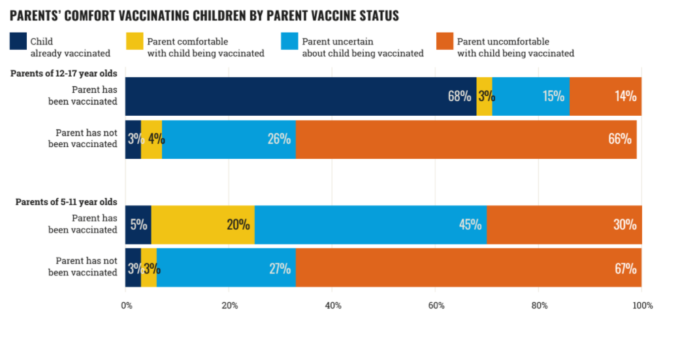Detroit parents less likely to vaccinate themselves than non-parents, leads to low youth vaccination rates

Contact: Lauren Slagter, 734-929-8027, lslag@umich.edu
DETROIT— Just under half (49%) of Detroit parents and guardians of children under 18 reported at the end of 2021 that they had been vaccinated against COVID-19, compared to 75% of adults who do not live with children.
These relatively low vaccination rates among parents in Detroit are particularly consequential due to their strong relationship with low vaccination rates among children. Unvaccinated parents (3%) are 22 times less likely than vaccinated parents (68%) to report that their children aged 12 through 17 have been vaccinated.
That’s according to a new report from the Detroit Metro Area Communities Study (DMACS), supported by University of Michigan’s Poverty Solutions initiative. The survey was administered to 1,900 Detroit households between Nov. 3 to Dec. 15, 2021. DMACS has been surveying representative samples of Detroit households since 2016, and survey responses are weighted to match Detroit’s population demographics and represent the views of the city as a whole.
While children between 5 and 11 years of age had only recently become eligible for the Pfizer-BioNTech COVID-19 vaccine at the time of the survey, parents’ vaccination status is also associated with their likelihood of obtaining a COVID-19 vaccine for their young children. Fully 67% of parents who have not been vaccinated said they were uncomfortable with the idea of getting their 5-11 year olds vaccinated compared to only 30% of parents who have been vaccinated.
Notably, there was no evidence of ethnoracial differences in vaccination rates among parents, despite evidence that White Detroiters are generally more likely to be vaccinated than residents of color. Roughly half of all parents, regardless of racial or ethnic identity, report being vaccinated.
“Recognizing the link between parents and kids’ vaccination status offers important insight as Michigan ramps up vaccination efforts targeted at children. Overcoming families’ vaccine hesitancy is absolutely critical as schools, sports, and youth programs work to provide safe spaces for children to learn and grow. Our findings clarify in part which youth are not getting COVID-19 vaccines, and why,” said Lydia Wileden, a doctoral candidate at U-M and research associate at DMACS.
Among unvaccinated parents, concerns around safety and effectiveness were the most commonly cited reasons for not vaccinating. Eighty-six percent of parents cited concerns over the safety and potential side effects of the vaccine as contributing to their decision to not be vaccinated. Additionally, three-quarters (76%) of parents cited doubt about the effectiveness of the vaccine as contributing to their decision to not be vaccinated.

“The share of parents who are uncertain about having their children vaccinated for COVID-19 indicates an opportunity for more outreach and education to address families’ unanswered questions about the vaccine. The latest DMACS survey offers new insights on those parents’ attitudes,” said Jeffrey Morenoff, one of the faculty research leads for DMACS, professor of public policy and sociology, and research professor at U-M’s Institute for Social Research.
Lower vaccination rates among parents do not appear to be due to doubts about the seriousness of the COVID-19. Similar to the results reported in August 2021, parents continue to report feeling significantly less safe engaging in many social activities during the COVID-19 pandemic than other adults. For example, just two-thirds (66%) of parents feel safe going grocery shopping and 59% feel safe going to the doctor, compared to 82% and 80% of other adults, respectively.
Importantly, vaccination rates among adults in Detroit are still changing. Nearly 3 in 10 adults (28%) who had not been vaccinated in June 2021 have since been vaccinated. In the next DMACS report, we will explore how vaccination rates among adults in Detroit have changed over time.
This wave of the survey was conducted in collaboration with, and supported by, Michigan CEAL: Communities Conquering COVID (MICEAL), a community-based participatory research partnership working to enhance knowledge and understanding and reduce COVID-19 inequities among communities most impacted by the pandemic. This research is supported by the National Institutes of Health (1 OT2 HL 156812). For more on Michigan CEAL, please visit www.michiganceal.org.
